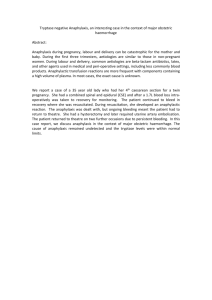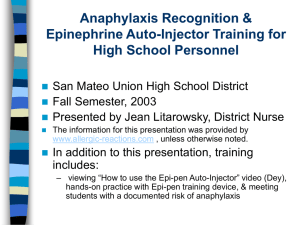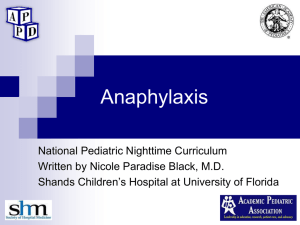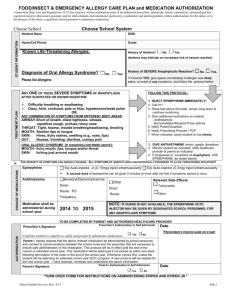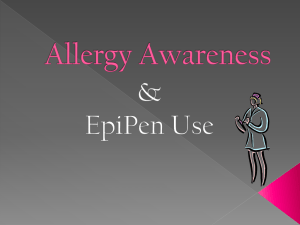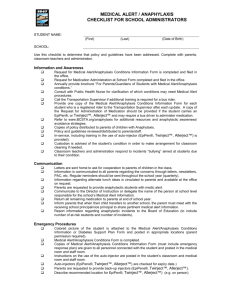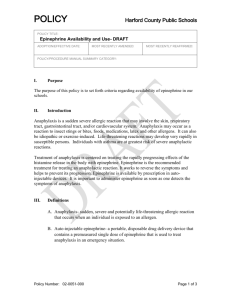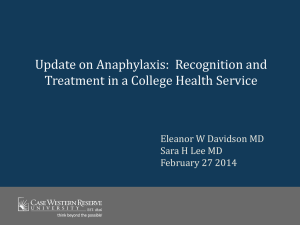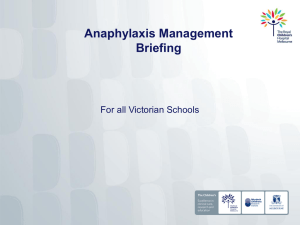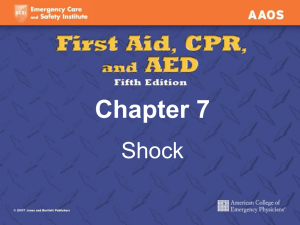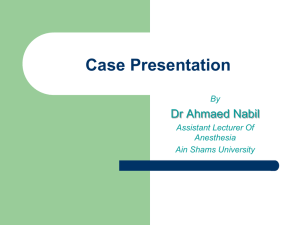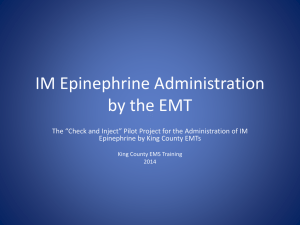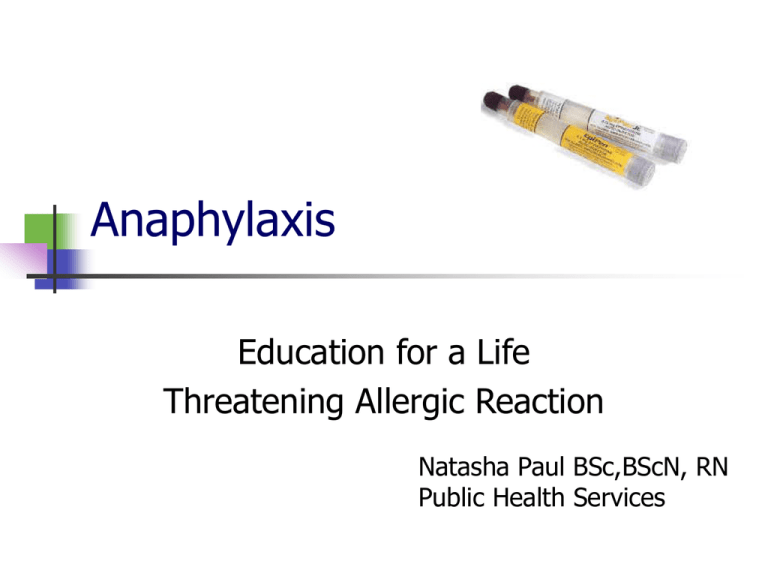
Anaphylaxis
Education for a Life
Threatening Allergic Reaction
Natasha Paul BSc,BScN, RN
Public Health Services
Objectives
Identify participant at risk
Define anaphylaxis
Describe the signs and symptoms
Identify triggers for anaphylaxis
Discuss treatment of anaphylaxis
Discuss avoidance strategies
Be able to use an epinephrine auto-injector
Goal for Recreational Programs
To create an “allergy-safe” environment
Prevention of an allergic emergency
through
Education
Awareness
Training
Identify the Participants at
Risk
Recognize Particpants
Picture
MedicAlert® bracelet
Anaphylaxis emergency plan
Know the symptoms
Anaphylaxis Emergency Plan
What is Anaphylaxis?
Medical Emergency
A severe life threatening allergic
reaction
Death can occur within minutes
Can involve more than one body system
What are the Signs and
Symptoms?
Skin
hives
swelling
itching
redness
Respiratory
sneezing
cough
shortness of
breath
wheeze
hoarse voice
trouble speaking
trouble
swallowing
throat tightness
chest
pain/tightness
Cardiovascular
lightheadedness
dizzy
unsteady
feeling faint
drowsy
Gastrointestinal
nausea
vomiting
diarrhea
stomach pain
Other
anxiety
feeling something bad is going to
happen
“impending doom”
Key Messages
Unpredictable
Never ignore early symptoms
Antihistamines do not prevent
anaphylaxis
Asthma medicine do not prevent
anaphylaxis
Assistance may be required to use the
auto-injector
Triggers for Anaphylaxis
Food
peanut
tree nuts
milk
egg
fish/shellfish
wheat
soy
Triggers for Anaphylaxis
Insect Stings
Medication
Latex
Factors that increase the risk
of a severe allergic reaction
Asthma
No or delayed use of epinephrine
Treatment of Anaphylaxis
Epinephrine
Epinephrine
Hormone that is produced naturally in
the body
“fright & flight”
Drug of choice to treat anaphylaxis
No contraindications
Will not cause harm if given
When to give Epinephrine
Known exposure
Any inside symptoms
Generalized hives or swelling
If in doubt, give epinephrine
Managing Anaphylaxis
Administer epinephrine (note expiry
date)
Lie the person on his/her side
Call 911
Call parents
If reaction continues or worsens, a
second dose of epinephrine may be
given in 10-20 minutes
Location of the Epinephrine
Auto-injector
Places that are easily accessible
Check expiry date located on Epi
NOT in locked cupboards or drawers
Individuals should carry their own autoinjector
Extra auto-injectors in emergency firstaid kits (if possible)
Avoidance Strategies
(Food Allergens)
Do not eat the allergic food
Supervision of young children while
eating
No trading or sharing of food, utensils,
or containers
Wash hands before and after eating
Disposal of food items after eating
Avoidance Strategies
Table surfaces cleaned after eating
Ingredient list for food purchased
“No Eating” rule on buses
Non-food items or special activity to reward
or celebrate participants
Communication or Reminders - “It is that
time of year again…”via Community
Center/HRM using bulletins and newsletters
outlining the program’s anaphylaxis
plan/expectations.
Avoidance Strategies
(Insect Stings)
Eat in designated areas inside the
facility
Carry epinephrine auto-injector
Cover and empty garbage bins
Replace or repair broken screens on
windows
Remember:
Epi pens should not be expired or close
to expiration date. Inform parents if
they are.
If you overhear a child say he has an
allergy but you are unaware of this fact
– follow it up.
Legalities…
(Providing Treatment)
Volunteer Services Act:
Chapter 497 (Revised status 1989, amended 1992
C34)
An Act Respecting the
Protection of Persons Who
Voluntarily
Render Services or
Assistance
Legalities…
(Providing Treatment)
Volunteer Services Act:
Chapter 497 (Revised
status 1989, amended 1992 C34)
Emergency assistance to person
Where, in respect of a person who is ill, injured or
unconscious as a result of an accident or other
emergency, a volunteer renders services or
assistance at any place, the volunteer is not liable for
damages for injuries to or the death of that person
alleged to have been caused by an act or omission on
the part of the volunteer while rendering services or
assistance, unless it is established that the injuries or
death were caused by gross negligence on the part of
the volunteer, and no proceeding shall be
commenced against a volunteer which is not based
upon his alleged gross negligence. R.S., c. 497, s. 3.
Legalities…
Canadian Charter of Rights and Freedoms
provides: (s.15)
“15. (1) Every individual is equal before and under the
law and has the right to the equal protection and
equal benefit of the law without discrimination and,
in particular, without discrimination based on race,
national or ethnic origin, colour, religion, sex, age or
mental or physical disability. individual is equal
before and under the law and has the right to equal
protection and equal benefit of the law without
discrimination and in particular, without
discrimination based on …physical disability.”
Legalities…
Canadian Charter of Rights and
Freedoms provides: (s.15)
(2) Subsection (1) does not preclude any law, program
or activity that has as its object the amelioration of
conditions of disadvantaged individuals or groups
including those that are disadvantaged because of
race, national or ethnic origin, colour, religion, sex,
age or mental or physical disability.
How to use the EpiPen®
Remove EpiPen Auto-Injector from carrier tube
Hold firmly with orange tip pointing downward
Remove blue safety release (cap)
Push Orange tip firmly into mid-outer thigh until
you hear a “click”
Hold on thigh for several seconds (count to 10)
Built in needle protection (orange needle protector
extends to cover needle to protect you from a
needle stick injury)
Remove and return to storage container
Bring to hospital for disposal
How to use the EpiPen®
www.epipen.ca
How to use the Twinject™
Pull of Green cap #1 to see a red tip
Pull of Green cap #2
Press GREY tip against mid outer thigh
until a click is heard
Hold in place for a count of 10
Remove
How to use the Twinject™
Suggestion: Start taking Second dose
apart now and make it available.
Once Ambulance arrives, place Second
Dose or unused Epinephrine in case and
give to Ambulance Attendants.
How to use the Twinject™
Website Resources
www.allergysafecommunities.ca
www.epipen.ca
www.twinject.ca
www.anaphylaxis.org
www.foodallergy.org
Reference
Anaphylaxis in Schools & Other Settings
(2nd Edition, 2009)
Can be purchased for $15 (plus applicable taxes and
shipping and handling) from any of the following
organizations:
Allergy/Asthma Information Association (AAIA)
Anaphylaxis Canada
Association québécoise des allergies alimentaires (AQAA)
Canadian Society of Allergy and Clinical Immunology
(CSACI)
The proceeds from the sale of this document will help these
non-profit organizations continue their work in
anaphylaxis education, support, and research.
Questions
HRM Recreational Policy 2005

